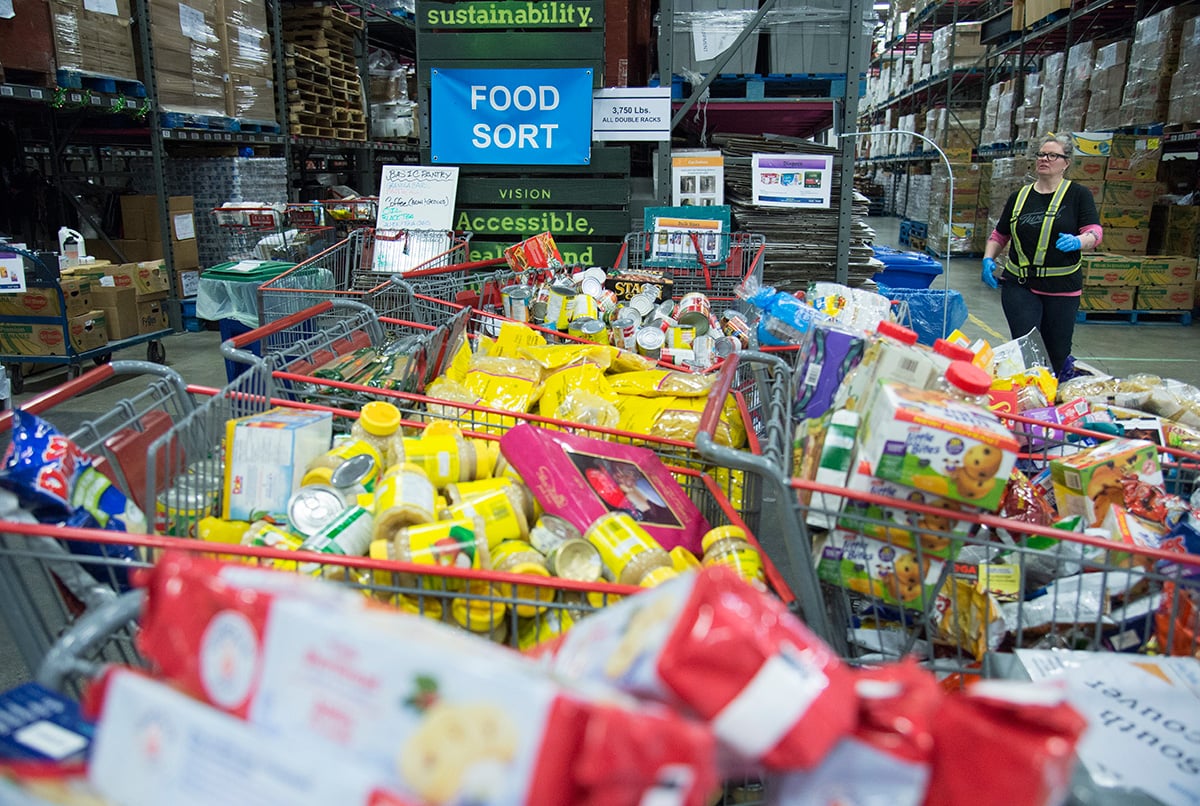It was 1985. I was sitting in a top-floor room of the now Fairmont Hotel in Vancouver waiting to be interviewed by Hana Gartner of CBC’s The Fifth Estate. She was taping a program about the spread of U.S.-style food banking across Canada.
From the window I could see the long line of men and women entering Christ Church Cathedral, then leaving with brown paper food bags courtesy of the Greater Vancouver Food Bank, established in 1983. Surreal and socially distancing.
In the interview we talked about the deep recession of the early 1980s, the fiscal restraint and punitive welfare reforms introduced by Social Credit in British Columbia — the early days of neoliberalism.
We discussed the effectiveness and ethics of charitable food banks dispensing surplus food as a solution to widespread domestic hunger and Canada’s broken social contract.
Canada had ratified the International Covenant on Economic, Social and Cultural Rights in 1976, which included recognition of the right to food. Our economic, social and cultural rights were supposedly protected by a European-style welfare state with universal health care, family allowances, pensions, employment insurance and provincial social assistance programs.
But people were still depending on charities for food.
Today corporate-backed food banking functions as B.C.’s parallel food charity economy. Its symbiotic tango with social assistance guarantees sub-poverty level welfare benefits while daily undermining human rights.
Yet public and political support is strong. As COVID-19 strikes, food bank donations pour in. Walmart ads celebrating its contributions flood our screens; Ottawa allocates $50 million to food banks across Canada; Victoria contributes another $3 million; even the proceeds of Dr. Bonnie Henry’s “limited edition” and brand-promoting Fluevog shoes, designed to recognize B.C.’s public health leader, are food-bank bound. Yes, we must do whatever it takes.
Little wonder at the community outrage created by the Greater Vancouver Food Bank’s pre-pandemic decision to increase admission eligibility by requiring additional pieces of paper ID for those seeking a bite to eat.
A petition by food bank supporters, anti-poverty activists and academics demanded its retraction. The decision was halted, but personal information is still being requested on a voluntary basis, even during the pandemic.
If we are all in this together, why not trust all food bank applicants, as the federal government is doing for those applying for the Canada Emergency Response Benefit? That would be a small step toward inclusiveness and away from the divisiveness of cataloguing the “deserving and undeserving” poor.
COVID-19 exposes deep poverty and wide fault lines within our welfare state. The Depression-era joblessness and vanishing incomes now threatening food insecurity for all has brought food banks rapidly to centre stage.
Yet food banks are always running out of food. How effective will they be? As our public health experts advise: follow the science, act on the evidence.
Notably, Health Canada collects world-class food insecurity data. A just released pre-pandemic food insecurity study by the Proof Food Insecurity Policy Research team should be mandatory reading for our political class. It makes clear widespread food insecurity in Canada is a public health emergency, a marker of material deprivation that brings huge costs to the economy, poorer mental health and higher mortality rates. Significantly, the report calls attention to its income-based causes and solutions.
Based on data from the 2017-18 national household survey and a definition of food insecurity as the “inadequate or insecure access to food due to financial constraints,” the study finds 4.4 million Canadians (an increase since 2012) reported living in food insecure households, including 555,700 British Columbians (that’s 12.4 per cent of the population). Alarmingly, these figures are underestimates. Those living on First Nations reserves, Crown lands and homeless people are excluded from the survey.
In wealthy B.C., 66 per cent of households reliant on social assistance are food insecure, a sad reflection of our moth-eaten social safety net. Shocking but not unexpected in a world embracing precarious work, 68 per cent of food-insecure households depend on wages, salaries or self employment, not income assistance.
Approximately 115,000 adults and children are living in “severely food insecure” households, reducing their food intakes, being without and going hungry. Other work by Proof shows that only 21 per cent of the severely food insecure in Canada turn to food banks.
The study finds “no evidence that food banks are a solution to the very serious problem of food insecurity in Canada.” For good reason: it is primarily an “income problem, not a food problem.”
There’s no denying a moral imperative to act, but U.S.-style food charity acts as a moral safety valve allowing the public to believe the problem is addressed while enabling politicians of all stripes to neglect their human rights obligations. However well-intentioned, the sheer scale of the problem is beyond the scope of charitable food banks.
COVID-19 is the opportunity for a comprehensive reimagining of the social contract and collective human rights. In the immediate future, as the BC Poverty Reduction Coalition has demanded, the province must increase social assistance rates first to 75 per cent, then 100 per cent of the poverty line. An essential step made more urgent by the pandemic and the need for wide-ranging income security, health and housing reforms.
In the longer term, food security for all must guarantee an adequate universal basic income, now inadvertently being piloted by the Canada Emergency Response Benefit. Public policy now recognizes food is a basic human need and fundamental right: we all need secure incomes if we are to eat and pay the rent. Food handouts are not effective nor sustainable and, if we are all in this together, an affront to human dignity.
Yet universal basic income must not be at the expense of a massive investment in public health and social programs. Non-profits providing meals must be adequately funded, no longer relying on food banks and ad hoc charity. We must bid farewell to government-funded Walmart food banking channelling wasted food to hungry people. Ending food insecurity must be an outcome of successful poverty reduction policies, fair income distribution and progressive taxation.
If political will is lacking, the stigma and social distancing of the 1980s’ breadlines live on.
Read more: Rights + Justice, Food
















Tyee Commenting Guidelines
Comments that violate guidelines risk being deleted, and violations may result in a temporary or permanent user ban. Maintain the spirit of good conversation to stay in the discussion.
*Please note The Tyee is not a forum for spreading misinformation about COVID-19, denying its existence or minimizing its risk to public health.
Do:
Do not: